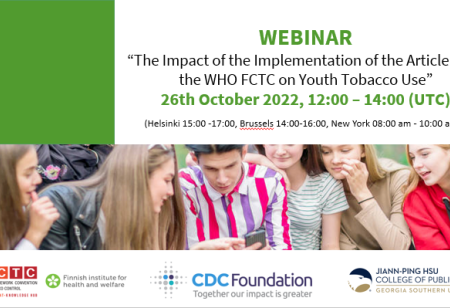
Strengthening tobacco surveillance in LMICs – Overview of project results - 19 February 2019

Strengthening tobacco surveillance in LMICs – Overview of project results
In 2018, the WHO FCTC Knowledge Hub on Surveillance carried out a project on supporting the implementation of Article 20 of the WHO FCTC in low- and middle-income countries (LMICs).
The project titled “Advising Parties on the establishment of tobacco surveillance systems in line with Article 20 of the Convention” aimed to strengthen tobacco surveillance, research and exchange of information in LMICs in line with Article 20.
The project was conducted with a grant provided to the Knowledge Hub by the Government of Norway, through the Secretariat of the WHO FCTC, and from a grant provided by the Finnish Ministry of Social Affairs and Health.
Activities carried out within the project included identifying LMIC Parties potentially interested in receiving technical assistance, provision of advice in the form of new materials targeted at LMIC Parties, and organizing a five-part webinar series focusing on topics relevant to LMICs.
The work carried out within the project forms a basis for further endeavors on strengthening and supporting tobacco surveillance and monitoring in low- and middle-income countries.
New materials on Article 20
As part of the project, new materials on Article 20 targeted especially to LMICs were designed and produced. The materials are serving as tools in providing advice to LMIC Parties of Convention, presenting current numbers and highlighting the benefits of implementing Article 20.
Two fact sheets were compiled based on a new analysis made of the Parties’ implementation reports from the 2018 WHO FCTC reporting cycle. The fact sheets present the implementation of the Article 20 by WHO regions, and by Parties’ income group.
A new brochure introduces key elements and benefits of investing in the implementation of Article 20. This new brochure complements the Knowledge Hub’s previous brochure which points out the key elements in effective tobacco control monitoring.
In addition, a fact sheet on effective tobacco control monitoring was designed and translated into Arabic, Chinese, French, Russian and Spanish, and is now available in all six UN languages.
All new materials are now available on the materials section of Knowledge Hub website as downloadable PDF files. The brochure is also available as a hard copy upon request.
Webinar series on supporting the implementation of Article 20 in LMICs
The WHO FCTC Secretariat’s Knowledge Hub on Surveillance organized a five-part webinar series as part of the project on supporting tobacco surveillance, research and exchange of information in LMICs.
The webinar series “Supporting low and middle income countries in the establishment of tobacco surveillance systems in line with the Article 20 of the WHO FCTC” hosted nine specialists in the field of tobacco control monitoring and research. The Knowledge Hub’s webinar series took place between the 12 October and 5 December 2018.
The topics of the webinars covered monitoring of tobacco control policies, tobacco use, and the health consequences of tobacco consumption. The themes also include promoting scientific research on tobacco use and tobacco control, as well as preventing tobacco industry interference in monitoring and research.
To promote the reach and use of the webinar recordings also in non-English speaking countries, the webinar presentations were translated into French and Spanish, the most common UN languages in LMICs after English. The presentations are provided with subtitles in three different languages, available for viewing on the Knowledge Hub website.
The webinar series and their video recordings have reached an extensive geographical area. The webinars received together more than 70 registrations from 29 countries all over the world, while the amount of participants in the webinars varied between 10 and 16.
The webinar recordings have already been viewed up to 336 times in 23 countries by February 2019. The statistics indicate that the webinar series has had visibility especially in South-East Asia, USA and Canada, Brazil and Western and Southern Africa, as well as many parts of Europe and Middle-East (Figure 1).

Figure 1: Webinar reach by Feb 2019
Altogether 10 LMICs, of which 9 are Parties to the WHO FCTC, were involved in the webinars either through registering or participating to the webinars, or by viewing the webinar recordings during the project. In 2019, the webinar recordings have reached one more LMIC Party.
The recordings will remain on the website of the Knowledge Hub for further viewing and use. In addition to the recordings, the webinar speakers have shared their slides which are available for downloading on the Knowledge Hub website. As an exception, one speaker is providing access to her presentation only upon request through our website.
The Knowledge Hub will continue to distribute the webinar recordings to support further work around the theme and to reach an even wider audience in the LMICs.





